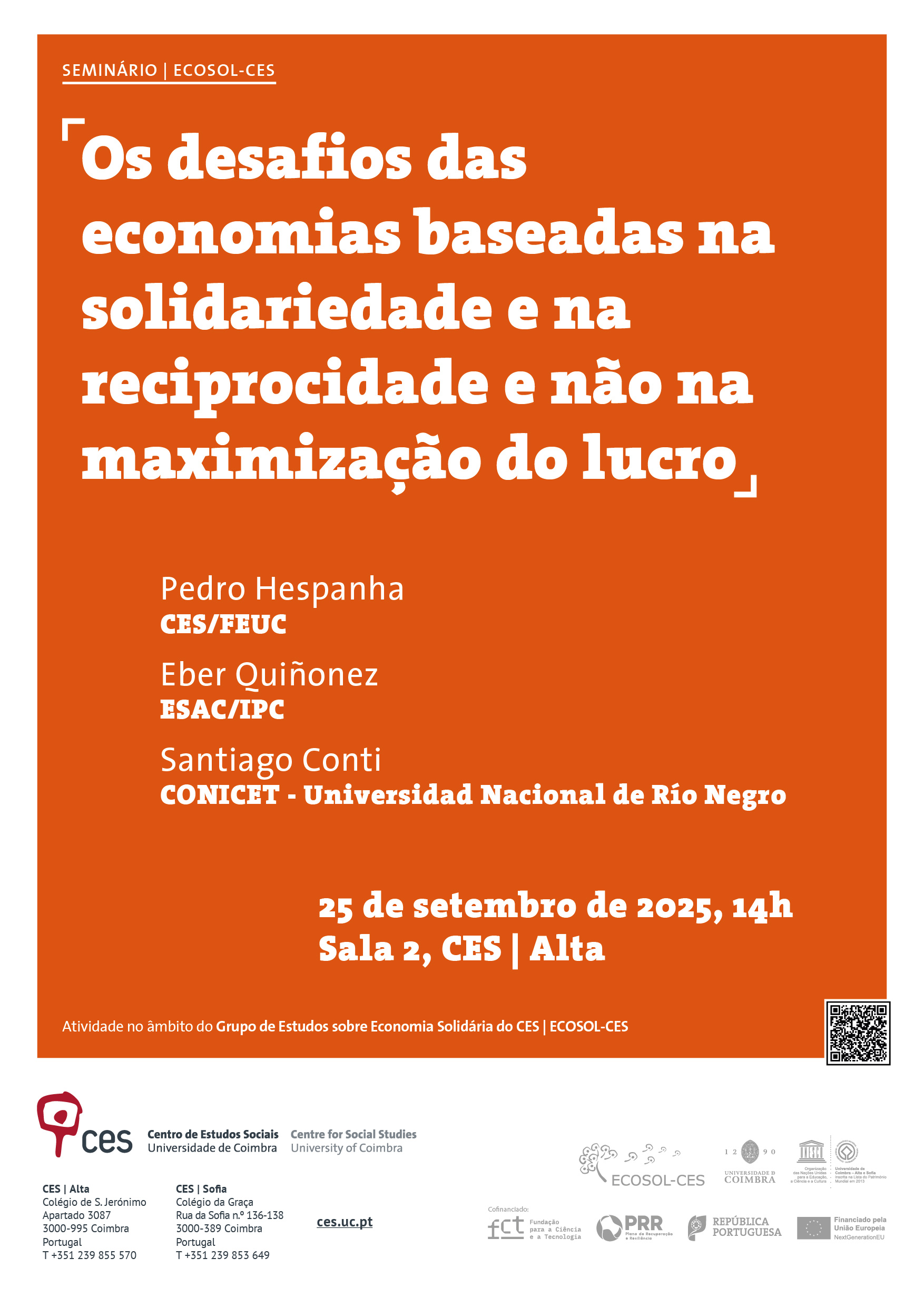ECOSOL - Economia Solidária
ecosol-ces Seminar
Challenges of economies based on solidarity and reciprocity rather than profit maximisation
Eber Quiñonez
Pedro Hespanha
Santiago Conti
date to be announced
Room 2, CES | Alta
In contrast to the dominant logic of individualism, competitiveness and productivism, values such as solidarity, cooperation, equity and sustainability are highlighted in many initiatives developed in very different territories. Some examples are workers' cooperatives that subvert precarious work, forms of communal property that challenge individualistic logic and market closures in rural and urban environments, digital platforms that escape the extractive logic of opaque algorithms, agroecological supply networks, and community associations that put collective care management into practice.
To substantially change the basic rules of how the current economy works, we need to radically rethink the role of work, markets, and property. An economy based on sustainability, equality, sufficiency, and care, which seeks to meet human needs by ensuring the equitable distribution of socially necessary work and social control over investment, will require a wide range of experiences and tools to achieve these goals.
A detailed analysis of these experiences allows us to understand the current horizon of possible transformations, along with the tensions, ambivalences and negotiations that emerge when these experiences interact — and sometimes collide — with institutional structures and moral, normative, and legal frameworks, as well as with the prevailing economic logic and existing ecological limits. It reveals the existence of one or more of the three interrelated dilemmas and tensions that experiences face when implementing their transformative aspirations: 1) dilemmas and tensions between the values they adhere to and their insertion into a capitalist market logic; 2) dilemmas and tensions between their political agendas and those promoted by public administrations; and 3) dilemmas and tensions between their long-term projection and/or the expansion of their proposals and the maintenance of ideological coherence.
Temporal projection and scalability present risks of replicating productivist and competitive logics, or styles of governance and organisation of social and ecological work that are unsustainable, according to the political and moral principles of the initiatives. This dilemma is particularly complex because the initiatives operate in a context where their sustainability and recognition of success are assessed on the basis of a logic of effectiveness, according to which: growth in scale (economic and social) and the ability to endure over time are what enable their sustainability, while also enabling recognition of their success, which, in turn, and often reciprocally, favours their sustainability.
This logic permeates the daily practises of the various experiences, but also opens up a range of issues that challenge the people who promote and participate in them. It is necessary to analyse how, in this context, initiatives seek to sustain forms of democratic participation and collective governance, despite the new organisational demands and workload that growth brings. There are strategies for welcoming and involving more diverse social groups, who see their participation as motivated by factors that go beyond activism: such as work, socialisation and learning, or as users of a service that meets specific needs. In this context, it is essential to review how the narrative structures and founding values that unite these projects and give them meaning are updated over time.
The transformative power of initiatives lies precisely in their agency, transforming these tensions and their own inconsistencies into spaces for critical reflection, experimentation, and collective action. However, their maintenance and advancement cannot depend solely on the resilience of those who sustain them on a daily basis, but require a need to promote the role of public institutions – beyond discursive recognition – as regulators of market pressures and effective facilitators of urgent eco-social transformations. It is necessary to strengthen and maintain forms of collective participation that go beyond a commitment based on responsible consumption or the satisfaction of individual needs. All of this implies a shared responsibility for the processes that enable initiatives: from access to resources to working conditions and organisational sustainability. In this sense, the potential of “Transformative Economies” lies not only in what they propose, but also in their ability to connect with agents and institutions that contribute to broader, sustained and shared processes of structural change.
Bio notes
Pedro Hespanha | Retired professor from the Faculty of Economics at the University of Coimbra and a founding member of the Centre for Social Studies. He has researched and published in the fields of rural studies, social policy, the sociology of medicine, poverty and social exclusion. He has been a visiting professor at several foreign universities and has participated as a principal investigator in several national and international research projects and networks. From 2008 to 2023, he coordinated the Solidarity Economy Study Group (ECOSOL/CES). pedro.hespanha@gmail.com
Santiago Conti | Doctor and Bachelor of Psychology (University of Buenos Aires -UBA). Master's degree in Community Psychology (University of Chile - UChile). Diploma in Local Development and Social Economy (FLACSO). Associate Researcher at the National Council for Scientific and Technical Research (CONICET) in Argentina. Undergraduate university professor in the discipline “Science, ethics and socio-productive and environmental intervention” in Environmental Engineering, Electronics, Telecommunications and Bachelor's Degree in Economics at the National University of Río Negro (UNRN). Postgraduate university professor at UNRN and UBA. Areas of work (teaching, research, extension) Family Farming – Rural Extension – Social Intervention Models – Scientific and Technological Research – Social Technologies – Rural Development – Social and Solidarity Economy – Short Marketing Channels – Gender Studies – Community Organisation
Eber Quiñonez | Researcher at the Higher Agricultural School of the Polytechnic Institute of Coimbra (ESAC/IPC), working on the Agrovila project, and is also a member of the Solidarity Economy Study Group (ECOSOL/CES). He holds a PhD and Master's degree in Sociology from the Faculty of Economics of the University of Coimbra and a degree in Psychology from the University of San Carlos in Guatemala. His research interests include small-scale agricultural production, family farming, food production and consumption, the commons, and solidarity economy.


